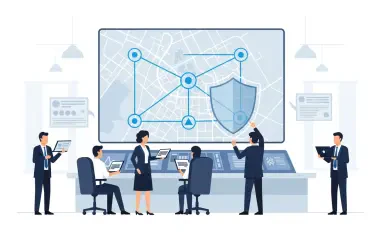The global data center logical security market is experiencing significant growth due to the increasing frequency and sophistication of cyber threats. As organizations prioritize robust data protection measures, the evolution of data center security becomes crucial. This article delves into the key factors driving this evolution and the emerging trends shaping the future of data center security.
Market Size and Growth
Rapid Market Expansion
In 2024, the global data center logical security market was valued at $15.70 billion, a figure reflecting the robust demand for data protection solutions. The market is projected to grow at a compound annual growth rate (CAGR) of 17.2% from 2025 to 2030, reaching $40.19 billion by the end of the forecast period. This remarkable growth is driven by the rapid adoption of technologies such as cloud computing, the Internet of Things (IoT), and big data analytics. As these technologies become more deeply integrated into various industries, the need for advanced security measures to protect sensitive data intensifies, necessitating substantial investments in data center logical security.
Organizations leveraging cloud computing and IoT are particularly vulnerable to cyber threats, given the extensive and interconnected nature of these networks. The envisaged growth underscores the importance of adopting sophisticated security tools and solutions that can adapt to the dynamically evolving threat landscape. Consequently, businesses are compelled to invest heavily in securing their data centers, implementing enhanced encryption methods, multi-factor authentication (MFA), and other proactive measures to effectively safeguard their assets against potential cyberattacks.
Drivers of Market Growth
The increasing sophistication of cyber threats, such as data breaches, ransomware attacks, and unauthorized access, has severe financial, operational, and reputational impacts on businesses globally. To mitigate these threats, organizations are prioritizing robust data security measures, including encryption, multi-factor authentication (MFA), and identity access management (IAM) solutions. Furthermore, governments and regulatory bodies worldwide are enforcing stringent data privacy laws, compelling organizations to adopt strong data protection measures in their data centers. Compliance with regulations like the General Data Protection Regulation (GDPR) in Europe and the California Consumer Privacy Act (CCPA) in the U.S. drives the demand for logical security solutions.
Organizations unable to meet these regulatory mandates risk significant fines and legal repercussions, further emphasizing the necessity of comprehensive data protection strategies. The convergence of technological advancements and regulatory pressures is reshaping the landscape of data center security, setting a precedent for more stringent and adaptive security measures. The widespread recognition of these drivers ensures sustained investments in advanced logical security solutions, propelling market growth as businesses strive to maintain compliance and fortify their defenses against increasingly complex cyber threats.
Sophistication of Cyber Threats
Evolving Threat Landscape
Businesses today face increasingly complex cyber threats that necessitate advanced security solutions to safeguard their sensitive information. The ever-evolving landscape of data breaches, ransomware attacks, and unauthorized access presents formidable challenges, making the adoption of comprehensive security measures imperative. Encryption, multi-factor authentication (MFA), and identity access management (IAM) solutions have become essential tools in protecting sensitive data from unauthorized intrusions and breaches. The rapid evolution of these threats underscores the need for continuous innovation in security solutions, ensuring that organizations remain one step ahead of malicious actors.
The growing complexity of cyber threats is not only a technological challenge but also an operational imperative. Businesses must recognize that the sophistication of these threats requires a multi-layered defense strategy. This includes the implementation of advanced encryption techniques to protect data at rest and in transit, MFA to ensure secure access control, and IAM solutions to effectively manage user identities and permissions. The dynamic nature of cyber threats demands that organizations adopt a proactive stance, investing in technologies and strategies that provide robust and adaptive defenses against an ever-expanding array of cyber risks.
Impact on Organizations
The financial, operational, and reputational impacts of cyber threats are significant, compelling organizations to invest in advanced security solutions to safeguard their data and maintain trust with their customers. The growing complexity of cyber threats underscores the necessity for continuous monitoring, threat detection, and incident response capabilities to mitigate potential risks. Organizations that fail to implement adequate security measures risk severe financial losses, operational disruptions, and damage to their reputations, which can have long-lasting consequences on their business operations.
Investing in advanced security solutions is not only about mitigating risks but also about building resilience against future threats. Continuous monitoring enables organizations to detect anomalies in real-time, facilitating prompt responses to emerging threats. Implementing sophisticated threat detection mechanisms and developing comprehensive incident response plans ensures that organizations can quickly and effectively address security breaches when they occur. By prioritizing these capabilities, businesses can protect their valuable data assets, uphold their reputations, and navigate the increasingly perilous cyber threat landscape with confidence.
Regulatory Compliance
Stringent Data Privacy Laws
Governments and regulatory bodies worldwide are enforcing stringent data privacy laws, such as the General Data Protection Regulation (GDPR) in Europe and the California Consumer Privacy Act (CCPA) in the U.S. These regulations mandate stringent security controls, encryption, and access restrictions to protect personal and financial data. Organizations must comply with these regulations to avoid significant fines and penalties, driving the demand for logical security solutions. The necessity to adhere to these regulatory requirements compels organizations to adopt comprehensive security measures that not only ensure compliance but also enhance overall data protection.
Compliance with data privacy laws involves a multifaceted approach that integrates advanced security technologies and best practices. Organizations must implement robust encryption to protect data both at rest and during transit, employ multi-factor authentication (MFA) to secure access to sensitive information, and establish stringent access control policies to ensure that only authorized individuals have access to critical data. These measures are critical for maintaining compliance and protecting against potential breaches. Additionally, regulatory compliance drives organizations to continuously assess and update their security strategies, ensuring that they remain aligned with evolving laws and industry standards.
Compliance-Driven Security Measures
To comply with data protection regulations, organizations are adopting comprehensive logical security measures. These measures include encryption, MFA, and intrusion detection systems to safeguard sensitive information. Compliance with regulations not only helps organizations avoid penalties but also enhances their overall security posture by enforcing strict standards for data protection. The adoption of these measures underscores the importance of regulatory compliance in driving the implementation of robust, proactive security strategies that effectively mitigate risks.
Organizations must recognize that compliance-driven security measures provide a foundation for building resilient defenses against cyber threats. By integrating encryption, MFA, and intrusion detection systems into their security frameworks, businesses can enhance their ability to detect and respond to potential breaches, minimizing the impact of cyber threats on their operations. These measures also contribute to building trust with customers and stakeholders, demonstrating a commitment to data protection and regulatory adherence. As regulatory landscapes continue to evolve, organizations must stay vigilant and proactive, continuously refining their security strategies to ensure compliance and resilience against emerging threats.
Cloud and Virtualized Environments
Migration to Cloud Infrastructure
The migration to virtualized environments and cloud infrastructure increases the complexity of securing access to virtual machines, network segments, and storage resources. Organizations moving to the cloud face unique challenges in maintaining data security, requiring innovative and comprehensive security measures to manage the risks associated with these dynamic environments. Advanced logical security tools, such as monitoring, segmentation, and encryption, are vital for protecting cloud-based and virtualized data centers. These tools enable businesses to implement robust, adaptive security strategies that address the specific vulnerabilities and risks inherent in virtualized environments.
As more organizations transition to the cloud, the critical need for secure access controls and data protection becomes increasingly evident. Cloud-based environments introduce new attack vectors, making it essential for businesses to continuously monitor and secure their virtual machines and network segments. Implementing advanced security tools such as encryption, multi-factor authentication (MFA), and identity access management (IAM) solutions helps organizations safeguard sensitive data and prevent unauthorized access. These proactive measures ensure that businesses can confidently leverage the benefits of cloud computing while maintaining robust security.
Securing Virtualized Data Centers
Securing virtualized data centers requires a multi-faceted approach that addresses the unique challenges of virtual environments. Organizations must implement advanced security tools to monitor and protect their virtual environments, including continuous monitoring, segmentation, and encryption to ensure that sensitive data remains secure. This approach provides a comprehensive defense against potential cyber threats, enabling businesses to detect and respond to anomalies in real-time. The complexity of securing virtualized environments underscores the importance of adopting holistic security measures that effectively mitigate risks and protect valuable data assets.
Virtualized data centers present distinct security challenges that require businesses to rethink traditional security paradigms. Continuous monitoring allows organizations to detect and address security issues promptly, while segmentation helps isolate critical resources and prevent lateral movement by attackers. Encryption ensures that data remains protected, even if unauthorized access is achieved. By adopting a layered security approach that integrates these advanced tools and techniques, organizations can create a resilient defense framework that effectively safeguards their virtualized data centers against potential cyber threats.
Managed Security Services (MSS)
Importance of MSS
Managed security services account for the largest revenue share in 2024, exceeding 40.0%, highlighting their critical role in contemporary data center security strategies. Many enterprises, especially small and medium-sized businesses (SMBs), lack the in-house expertise to handle evolving threats, making MSS an essential component of their security arsenal. MSS helps bridge this gap by providing 24/7 security monitoring, vulnerability management, and threat detection services. These services are vital for organizations that need continuous protection but lack the resources to manage security in-house, offering a scalable and cost-effective solution for maintaining robust security defenses.
The growing reliance on MSS underscores the importance of having expert security support to navigate the complexities of modern threats. By outsourcing security to MSS providers, organizations can focus on their core business activities while ensuring that their data remains protected. MSS providers offer extensive benefits, including real-time threat detection, incident response, and continuous monitoring, which are essential for safeguarding against the increasingly sophisticated cyber threats faced by businesses today. This comprehensive support enables organizations to maintain a proactive security posture and effectively manage potential risks without straining their internal resources.
Benefits of MSS
MSS providers offer a range of benefits that significantly enhance an organization’s security posture. Continuous monitoring enables real-time detection of anomalies and potential threats, facilitating prompt responses to security incidents. Threat detection mechanisms identify and mitigate risks before they can cause significant damage, while incident response services ensure that organizations can swiftly address breaches when they occur. By leveraging the expertise of MSS providers, businesses can implement a comprehensive and adaptive security strategy that effectively addresses the evolving threat landscape.
Outsourcing security to MSS providers also offers operational and financial advantages. By entrusting security operations to experts, organizations can reduce the burden on their internal IT teams, allowing them to focus on strategic initiatives and core business functions. Additionally, MSS providers offer scalable solutions that can be customized to meet the specific needs of different organizations, providing flexible and cost-effective security options. The growing demand for MSS highlights the critical role these services play in helping businesses navigate the complexities of modern cyber threats and maintain robust, proactive security defenses.
Consulting and Advisory Services
Growing Demand for Expert Guidance
The consulting and advisory services segment is expected to grow substantially due to the increasing frequency and sophistication of cyber threats. Organizations are recognizing the importance of expert guidance in developing proactive defense strategies, incident response plans, and threat intelligence programs to safeguard their data centers effectively. Consulting and advisory services provide specialized knowledge and expertise that help businesses stay ahead of emerging threats and ensure their security measures are up to date. The growing reliance on these services underscores the critical need for continuous learning and adaptation in the face of evolving cyber risks.
Expert guidance is essential for navigating the complexities of modern cybersecurity challenges. Consulting services help organizations assess their current security posture, identify vulnerabilities, and develop tailored strategies to address specific risks. This proactive approach ensures that businesses can implement effective security measures that align with their unique operational requirements and regulatory obligations. By leveraging the expertise of consultants, organizations can enhance their resilience against cyber threats and build robust defense frameworks that protect their critical data assets and support long-term security goals.
Developing Proactive Defense Strategies
Consulting and advisory services play a crucial role in helping organizations develop proactive defense strategies to mitigate potential cyber risks. This includes creating comprehensive incident response plans, conducting threat intelligence programs, and implementing best practices for data protection. By working with consultants, organizations can gain valuable insights into emerging threats and develop tailored strategies to address specific vulnerabilities. This proactive approach is essential for maintaining robust security defenses in an ever-evolving threat landscape, ensuring that businesses can quickly and effectively respond to potential breaches and minimize their impact.
Developing proactive defense strategies involves a thorough assessment of an organization’s security needs and vulnerabilities. Consultants work closely with businesses to identify potential risks, prioritize security investments, and implement best practices for data protection. This collaborative process results in the creation of customized security frameworks that address unique operational challenges and regulatory requirements. By adopting a proactive stance, organizations can build resilient defenses that not only prevent breaches but also enhance their overall security posture, fostering greater confidence in their ability to protect critical data assets and navigate the complexities of modern cyber threats.
Conclusion
The global data center logical security market is witnessing considerable growth, largely due to the rising frequency and complexity of cyberattacks. As cyber threats become more advanced and prevalent, organizations are prioritizing strong data protection measures. This shift has made the evolution of data center security a critical concern for businesses aiming to protect sensitive information.
Several key factors are driving advancements in data center security. One of the main drivers is the increasing sophistication of cyber threats, which demands more robust and advanced security measures. Another factor is the growing recognition among businesses of the importance of strong data protection protocols to safeguard against potential breaches and data loss.
Moreover, emerging trends are also shaping the future of data center security. One such trend is the integration of artificial intelligence (AI) and machine learning (ML) into security systems. These technologies can analyze vast amounts of data, identify unusual patterns, and detect potential threats in real-time, thereby enhancing the effectiveness of security measures. Additionally, the adoption of zero-trust security models, which require continuous verification of user and device identities, is becoming increasingly common.
In conclusion, the increasing complexity and frequency of cyber threats are propelling the growth of the global data center logical security market. By integrating advanced technologies and adopting new security models, organizations can better protect their valuable data and ensure business continuity.













